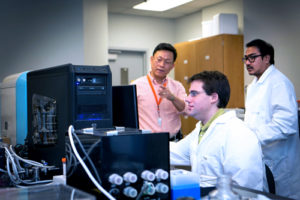Universities are constantly challenged to do more with less and to be “more entrepreneurial” about providing administrative services, while being asked to offer much more than just a classroom education to our students. Increasingly, universities support entrepreneurship and innovation that translates academic knowledge and technologies to the marketplace.
As CSU President Harlan Sands notes, “Our role as an anchor institution requires that we educate a diverse student body, perform cutting-edge research, and drive economic development that enriches both our students and the community.”
The TeCK Fund was born from the idea that the strengths of Cleveland State and Kent State are complementary, and that together we could support a robust technology validation accelerator that could create greater impact, and require fewer resources, than individual accelerators on each campus.
The TeCK Fund operates via a formalized, shared-resources framework to accelerate commercial development of discoveries originating within each institution. This mechanism provides pre-seed funding for both market validation and technical validation of faculty inventions, and serves as an important piece of each university’s entrepreneurship ecosystem.
“With the world-class talent on each campus as well as an increasing focus on interdisciplinary research and innovation, universities like Kent State and Cleveland State are becoming powerful engines for technology generation,” explains KSU President Beverly Warren.
Familiar challenges
Like most public universities, CSU and KSU have faced the significant headwinds of rising costs, reduced government support for higher education, and demographic trends that have led to flat or declining enrollment. The business model of higher education limits the ways in which costs can be contained.
Limited resources mean that finding efficiencies is always needed, but you can’t simply cut your way to prosperity. Developing a culture of innovation and supporting entrepreneurial faculty can help alleviate these strains by direct value creation through licensing of university-derived technologies and creating successful spinoffs. Both enhance the reputation of the university and can provide experiential learning options and ultimately jobs for our students. This in turn helps attract more students to our campuses.
A unique solution in the form of the TeCK Fund
The TeCK Fund seeks to leverage this opportunity by better utilizing resources and helping to simplify business processes. A cross-campus approach has the obvious benefit of uncovering a larger pool of candidates and a broader portfolio of technologies to potentially receive entrepreneurial support (and ultimately, greater deal flow volume that can attract the interest of investors). This has led to $1.4 million in funding being made available since the TeCK Fund launched in 2017, with significant support from the State of Ohio’s Technology Validation Startup Fund (TVSF) program. Individually, each campus would produce a relatively low volume of activity, so consolidating via the TeCK fund provides an opportunity for us to spread the costs related to securing the specialty resources needed to assist our faculty entrepreneurs.
In alignment with the State of Ohio’s technology priority areas, the TeCK Fund focuses on a pipeline of technologies in medical diagnostics, healthcare solutions and best practices, liquid crystals and material science, cybersecurity and mobile authentication, exercise physiology, biology, environmental design, and chemistry.
“CSU and Kent State have unique research portfolios that provide significant opportunities for commercialization in a host of fields that are growth areas for the economy,” adds Jack Kraszewski, director of the Technology Transfer Office at CSU.
Due diligence is conducted by CSU and KSU staff and a team of external mentors drawn from the networks of each university. Both universities have also used this as an educational opportunity for entrepreneurial-minded business students. On a project-by-project basis, additional due diligence support includes mentors from JumpStart, a Cleveland-based venture development organization, as well as specific technical experts, or other resources as needed. In addition, a combined team brings more experience and a broader set of perspectives to bear, as well as more eyes to provide oversight to keep projects on track and provide extra assistance when required.
Early successes
Since the TeCK Fund launched, both campuses have experienced an uptick in interest from faculty who want to see their discoveries move to the marketplace, or who simply want to utilize entrepreneurial tools to inform how they conduct research. Both institutions are seeing immediate results. Dr. Moo-Yeal Lee, an associate professor of chemical and biomedical engineering at CSU, received funding to help commercialize his technology Miniaturized 3D Bioprinting of Human Cells on a Chip for Disease Modeling. Since then, Dr. Lee’s startup company, Bioprinting Laboratories, Inc. of Pepper Pike, OH, has received an additional $150,000 for the next phase of development and commercialization of his tissue culture-based testing technology.
At Kent State, Dr. Torsten Hegmann and Dr. Elda Hegmann received a TeCK Fund grant through their startup company, Torel, LLC, to make and test liquid crystal-nanoparticle sensors to detect toxic gases and vapors. The TeCK support led to a $330,000 GOALI (Grant Opportunities for Academic Liaison with Industry) award from the National Science Foundation to further their research with Merck Materials of Darmstadt, Germany. Merck Materials is the supplier of the liquid crystal materials used for the sensors, and the grant will help develop additional uses for the technology.
Steve Roberts, KSU’s Director of Technology Commercialization and Research Finance, sees a bright future. “The TeCK Fund presents both an opportunity to generate more university-based startups and to give them the assistance they need to address real market needs, and in turn have a realistic chance to survive and thrive as businesses.”
- Using real-world tools to prepare students for the workforce - April 18, 2024
- 8 top trends in higher education to watch in 2024 - April 16, 2024
- Defining a path to equitable AI in higher education - April 12, 2024

